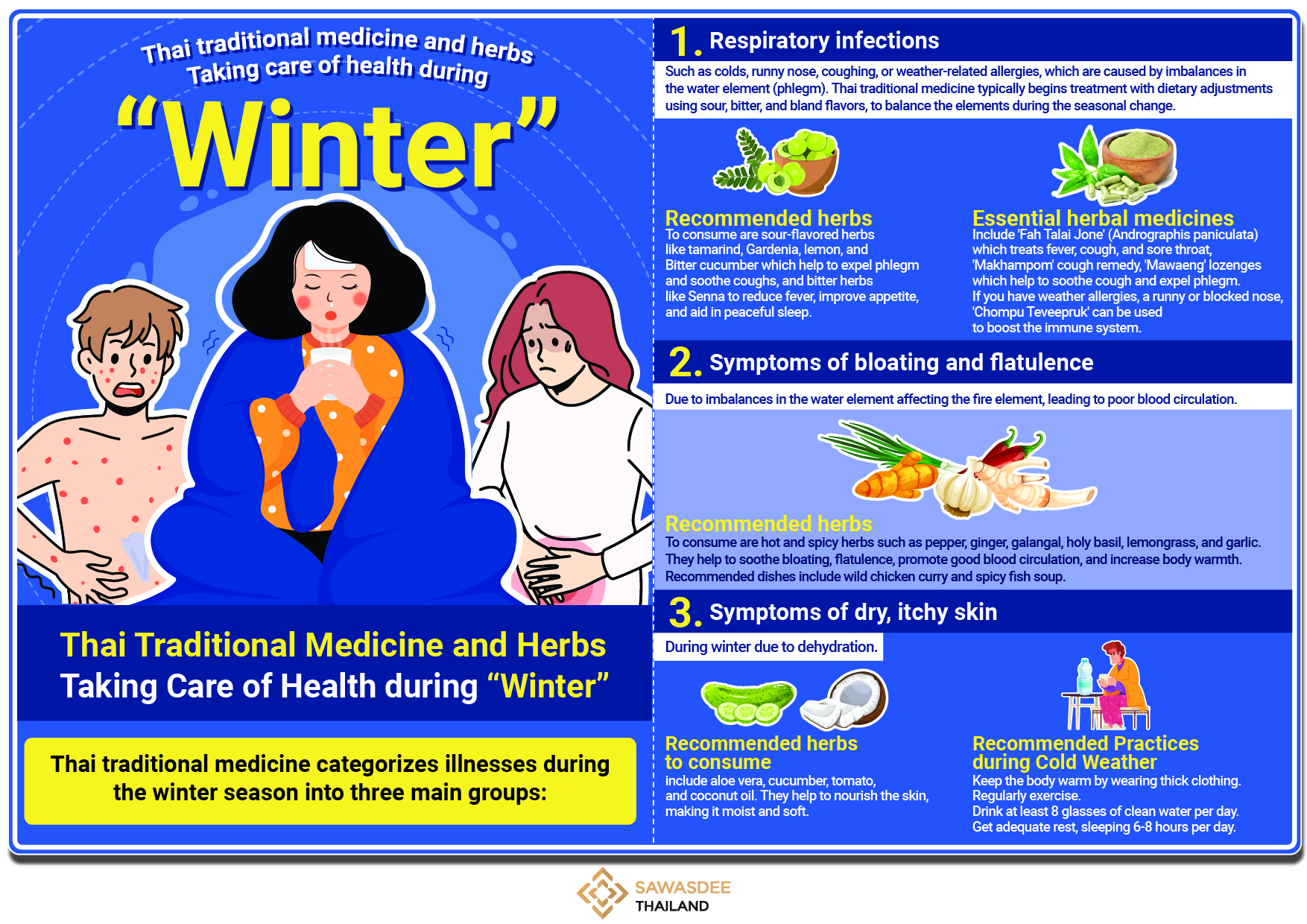
The seasonal transition from the rainy season to winter, although the winter period in Thailand is relatively short, can still cause sudden changes in the weather, which may cause the body to struggle to adjust, leading to illness.
According to Thai traditional medicine, the winter season is associated with the water element, which can cause diseases because it is a period when heat from the rainy season remains in the body. Thus, rapid weather changes can cause an imbalance in the fire element, resulting in a susceptibility to illness. People with strong immunity may not exhibit any symptoms, but those with weaker immunity are vulnerable, making them much more prone to disease. Cooler weather can exacerbate phlegm, causing allergic reactions, nasal congestion, coughing, runny nose, chills, shivering, and low-grade fever.
Thai traditional medicine categorizes illnesses during the winter season into three main groups:
1. Respiratory infections such as colds, runny nose, coughing, or weather-related allergies, which are caused by imbalances in the water element (phlegm). Thai traditional medicine typically begins treatment with dietary adjustments using sour, bitter, and bland flavors. For instance, it is traditional to consume sour curry with Sesbania grandiflora at the end of the rainy season and the beginning of winter to balance the elements during the seasonal change. The spicy heat of the curry ingredients nourishes and resolves issues related to the wind element (rainy season), and the sourness from tamarind helps expel phlegm, nourishing and resolving issues related to the water element (winter). Additionally, Sesbania grandiflora, with its bitter taste, can help to alleviate wind-head fever. Other suggested dishes include mackerel soup, tamarind chili paste, and vegetables.
Herbs to consume during this period include sour-tasting herbs which help expel phlegm and soothe coughing, such as tamarind, Billimbi, lime, and Emblica. Bitter herbs such as Sesbania grandiflora and Azadirachta indica can help reduce fever, stimulate appetite, and promote peaceful sleep.
Essential herbal medicines to keep on hand include "Fa Tha Lai Jone" which helps treat fever, coughing, and sore throat, and "Ma Waeng Khruea" cough medicine. These medicines can be prescribed by Thai traditional or applied Thai traditional practitioners at any state-run hospital's Thai traditional medicine clinic nationwide.
2. Abdominal bloating and flatulence caused by imbalances in the water element that affect the fire element in the body, causing blood circulation to be less efficient. It is suggested to consume spicy and hot herbs to alleviate these symptoms, drive out the wind, improve blood circulation, and also warm up the body. Examples of these herbs are pepper, ginger, galangal, holy basil, lemongrass, and garlic. Recommended dishes include jungle curry (Keang Pa) with free-range chicken and fish Tom Yum.
3. Dry and itchy skin conditions are prevalent during winter due to dehydration. Thai traditional medicine recommends herbs such as aloe vera, cucumber, tomato, and coconut oil, which help nourish the skin, making it moist, soft, and smooth.
During this colder winter period, one can maintain their health and prevent diseases by keeping the body warm, wearing thicker clothing, exercising regularly, drinking at least 8 glasses of clean water per day, and ensuring sufficient sleep of 6-8 hours per day.
